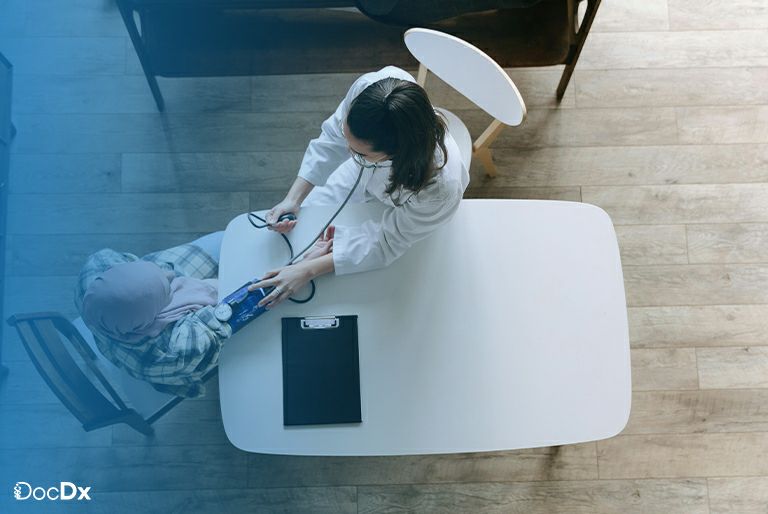Hearing the words colon cancer screening may stir up a mix of emotions worry, confusion, or maybe even avoidance. But the truth is, colon cancer is one of the most preventable cancers, especially when caught early through proper screening. At DocDx, we believe preventive care is about empowering patients with knowledge, offering guidance, and making health decisions less overwhelming. Colon cancer screening isn’t just a test it’s an investment in your long-term health and peace of mind.
Why Colon Cancer Screening Matters
Colon cancer, also known as colorectal cancer, begins in the large intestine or rectum. It often starts silently, with no obvious symptoms until it progresses. The good news? When detected early, it’s highly treatable. Screening can find precancerous polyps tiny growths that can be removed before they turn cancerous. In other words, screenings save lives.
Who Should Get Screened?
Most adults should begin routine colon cancer screening at age 45. However, your provider may recommend earlier screening if you have:
- A family history of colorectal cancer or advanced polyps
- Genetic conditions such as Lynch syndrome or FAP
- Inflammatory bowel disease (IBD), Crohn’s, or ulcerative colitis
- A personal history of polyps
Your primary care provider will help tailor screening guidelines to your specific risk factors.
Types of Colon Cancer Screenings
There isn’t a one-size-fits-all approach. Several options exist, each with its benefits:
Colonoscopy
- The gold standard.
- Allows doctors to see the entire colon and remove polyps during the procedure.
- Recommended every 10 years for average-risk adults.
Stool-Based Tests
- Include Fecal Immunochemical Test (FIT) and stool DNA tests (like Cologuard).
- Less invasive, done at home, but need more frequent repetition (every 1–3 years).
Flexible Sigmoidoscopy
- Examine the lower part of the colon.
- Usually recommended every 5 years.
CT Colonography (Virtual Colonoscopy)
- Uses imaging to view the colon.
- Recommended every 5 years.
Your doctor will help determine which test best suits your lifestyle and health needs.
Preparing for a Colonoscopy
If a colonoscopy is recommended, preparation is often the part patients dread most. It usually involves:
- Following a clear liquid diet the day before.
- Drinking a bowel prep solution to clean out the colon.
- Arranging transportation since sedation is used.
While prep isn’t pleasant, it’s crucial for accurate results—and it’s a small step toward preventing a serious illness.
What to Expect During the Test
- Colonoscopy: Performed under sedation, takes 30–60 minutes. Most patients don’t remember the procedure.
- Stool Tests: Simple, at-home collection kits mailed to a lab.
- CT Colonography: Similar to a CT scan; no sedation required.
Screenings are generally safe, quick, and essential for preventive care.
Understanding the Results
- Normal results: No polyps or suspicious growths.
- Abnormal results: Polyps found (often removed during the colonoscopy) or suspicious findings requiring further evaluation.
Your provider will explain results clearly and guide next steps. At DocDx, we focus on building strong patient-provider relationships so you feel supported and informed every step of the way.
Why Early Detection Saves Lives
Colon cancer doesn’t develop overnight. Polyps often take years to progress into cancer. Regular screenings mean providers can intervene long before cancer becomes advanced, giving you more treatment options and a higher chance of recovery.
Overcoming Common Fears
It’s normal to feel nervous about colon cancer screening. Common concerns include discomfort, embarrassment, or fear of results. But remember screenings are routine, private, and done with your well-being in mind. Many patients find peace of mind knowing they’re taking preventive steps.
How Screening Fits Into Preventive Health
Colon cancer screening isn’t an isolated event. It’s part of a larger preventive health strategy, alongside:
These regular check-ins help patients stay proactive, not reactive, about their health.
Special Considerations
- Seniors: Screening may stop after age 75 depending on overall health.
- High-risk groups: Some patients may need more frequent or earlier screenings.
- Personalized care: Your provider will balance screening guidelines with your health history.
Conclusion
Colon cancer screening is one of the most effective preventive tools we have. It not only detects cancer early but can also stop it before it develops. At DocDx, we’re committed to making these screenings accessible, comfortable, and part of a broader focus on preventive care. Your health journey is unique, but one thing is universal: investing in screenings today can mean a healthier tomorrow.




